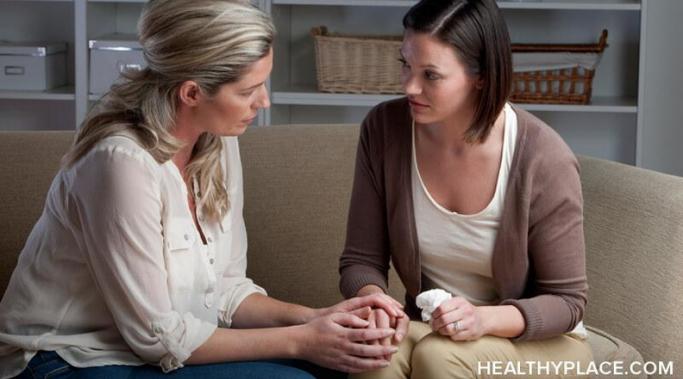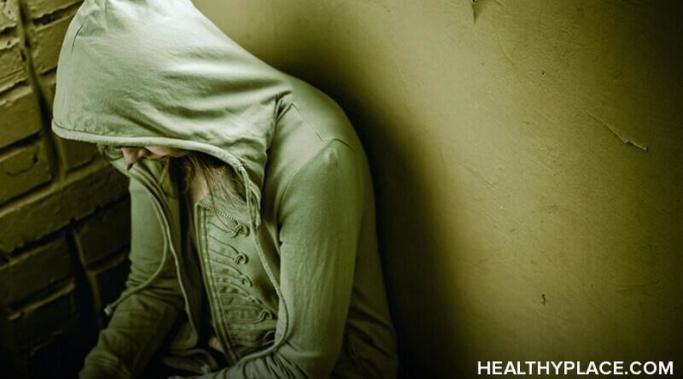I published my first post for the Coping with Depression blog here at HealthyPlace a full year ago. Today, I publish my last. Since that first, scary click of the Publish button, I've read fresh takes on my coping ideas, and I've challenged myself to think of depression in new ways. My experience writing for the Coping with Depression blog has rocked my tiny, blue world. I've realized a couple of valuable things during my year with HealthyPlace.
Depression Videos
Depression requires routine to successfully cope with the illness. Because depression is not routine, it is important and beneficial to establish patterns that structure the way you live in order to combat the surprises that depression can often throw your way. I'm finding that my depression affects me more the less I follow a routine. I am less capable of bouncing back from a bad brain day; I have less control over my rapidly shifting moods; I dismiss my basic needs (Depression Does Not Eliminate Your Basic Needs). I've learned the hard way that living well with depression requires routine.
Coping with depression challenges my self-control in a unique way. I have excellent self-control when I’m having a good brain day; by which I mean when my day is bright and my mind feels light and unburdened. I practice self-care even if I don’t want to and I do what I need to do without complaint. But when I’m having bad brain days and my depression is at its most extreme, my self-control disappears. I make excuses to let myself off the hook for not practicing self-care by not using self-control to properly cope with my depression.
Comparing yourself to others is not beneficial while coping with depression. I live by the phrase, “Comparison is the thief of joy.” It means that comparing something of yours to someone else’s can steal good feelings. And while it can certainly eliminate joy or gratitude, a comparison can also steal validation (Mental Illness Validation: Tell Me 'I Believe You'). Mental health is a vast and varied experience that features ups and downs and pushes and pulls that I can guarantee are not the same for any individual. So comparing your mental progress and experience while coping with depression against someone else’s progress and experience can create massive setbacks in your coping.
My last few weeks have been incredibly active, and it has been great for my brain (Does Exercise Really Make a Difference?). I’ve been doing some home renovations and helping a friend prepare her store for her big fall opening, working early mornings and late nights. Throughout the active weeks, my brain consistently felt more positive and less messy. I loved being active, and the little successes and physical activity involved with the weeks’ activities were beneficial in coping with my depression.
Relationships require communication around depression self-care. I have to remind myself constantly that my depression self-care and mental health goals are mine, and mine alone. I do not share the same goals as others with similar brains, and I should not expect others to have the same goals. One of my uncles told me recently that, “Expectations are premeditated resentments.” Applying that idea to the intimate relationship I maintain with my partner, I realize that I have a lot of expectations regarding depression self-care and mental health, and that I need to communicate my depression self-care needs appropriately in order to successfully care for myself and maintain a healthy relationship.
I have good and bad brain days, and the intensity of my depression varies. Some mornings, I wake up and smile at the sun and sky, make myself a superb cup of coffee, and spend the day enjoying every second of activity. And some mornings, I struggle to open my eyes, I get angry about the beautiful weather, and I skip all of my meals (Depression Symptoms: What are the Symptoms of Depression?). There was a long span of time where I thought it was unfair that my depression seemed to go away and come back without warning, until I realized that I was viewing depression incorrectly. I didn't realize that depression shifts in intensity and that good and bad brain days just happen.
I’m Tiffanie Verbeke and I am the new co-author of Coping with Depression. I’m a freshly-graduated Interpersonal Communication Studies major, coffee addict, avid runner, and music enthusiast. I also pretend to be a good painter (which is an excellent coping mechanism). I have learned and experienced many challenging, wonderful things in my lifetime, but one of my most significant adventures has been learning about my brain. I was officially diagnosed in college with severe depression, anxiety, and mixed state bipolar disorder—a lovely combination of barriers to achieving optimal mental health.
Engaging in creative activities can relieve depression because the process can be relaxing, engaging and enjoyable (Exploring The Link Between Creativity and Mental Illness). The end result is often satisfying, too. We often forget to make time to be creative, but our we can find depression relief with creative activities.
Traveling with depression can be helpful and even healing, but it can also be stressful. Travel stress, or spending a lot of time in close proximity with other people and being out of normal routines, can sometimes provoke a worsening of depression symptoms. Here are some tips on travelling with depression.









